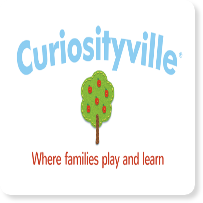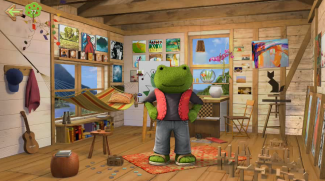Sue’s Focus Travels
LQ: 7.95
Recommended Age: 4+
Skills Used: Focus, Time Management, Mathematics, Writing

Curiosityville is an interactive learning website designed specifically for younger children. There are three different learning levels based on age, which children sign into before they begin play. From there, they meet meet 6 characters, each with a specific area of interest, who provide activities in different academic areas like art, science, math and reading. All of the activities employ a scaffolding method, where games increase in difficultly and build on prior knowledge as children progress through each activity. The games and activities coincide with national core educational standards, and a detailed report allows both parents and children to monitor their progress. In an effort to aovid excessive screen time, a message periodically pops up on screen prompting children to go outside and play on their own. Although the first 30 days are free, continued subscription costs $7.95 per month, or $79.95 for a year. Curiosityville ‘s range of early elementary academic activities comes recommended for use with children ages 3 to 8.
Getting started and then maintaining attention and effort to tasks.
 An important aspect of the focus thinking skill is goal-directed persistence, or demonstrating the ability to carry out a task until it is completed. The variety of games and activities keep the content engaging, and will attract the attention of younger users with high quality graphics and meaningful content, making them feel more compelled to complete each project that their furry friends ask them to do. Seeing as the game tracks progress, kids are given incentive to continue working, earning a tangible record of their efforts.
An important aspect of the focus thinking skill is goal-directed persistence, or demonstrating the ability to carry out a task until it is completed. The variety of games and activities keep the content engaging, and will attract the attention of younger users with high quality graphics and meaningful content, making them feel more compelled to complete each project that their furry friends ask them to do. Seeing as the game tracks progress, kids are given incentive to continue working, earning a tangible record of their efforts.
Recalling and retaining information in our mind while working.
Because Curiosityville uses the scaffolding method of instruction, it greatly exercises Working Memory, as each exercise builds on the next. The website picks up on how quickly and accurately children are answering the questions, as well. When users begin to show signs of proficiency, the games will increase in difficultly, forcing children to engage in more higher level thinking strategies the longer they spend on each activity. One game in particular, Rosie's microscope game, requires children to recall the shape and color of the various microscopic biological cells, and identify them once they are put under the magnified lens. This is just one of the many games on offer.
Understanding our own actions, thoughts and feelings.
 Although it's the parents section of Curiosityville which features the "Learning Tree" -- a personalized progress report that provides concrete feedback and information about children's unique learning skills, style, and progress -- it is still a good idea for children to browse through the report as well. The website compiles real-time information on what and how children learn across the 10 core learning areas. This data is transferred into detailed progress reports that are sent daily, weekly, monthly, and quarterly. These feedback tools go over strengths, interests, and needs based on how well children performed in the activities. It's a great opportunity for children to read about things they can improve, in addition to identifying their strengths.
Although it's the parents section of Curiosityville which features the "Learning Tree" -- a personalized progress report that provides concrete feedback and information about children's unique learning skills, style, and progress -- it is still a good idea for children to browse through the report as well. The website compiles real-time information on what and how children learn across the 10 core learning areas. This data is transferred into detailed progress reports that are sent daily, weekly, monthly, and quarterly. These feedback tools go over strengths, interests, and needs based on how well children performed in the activities. It's a great opportunity for children to read about things they can improve, in addition to identifying their strengths.
Developing a systematic approach for setting and achieving goals.
Not only do many of the games involve planning strategies (i.e., checkers), but the parents section features a calendar that helps parents and children plan out a regimented approach for using Curiosityville. Users can plot out times of day throughout the week to dedicate to the program, and the calendar separates blocks of online play, hands-on play, and practical activities, helping create a well-balanced play diet. It's one thing to use the online platform as a way to practice certain skills in an immersive and friendly environment. But if children and parents work together using the Curiosityville's weekly plan as a guide, their activities will have more planned-out direction.
 There are brief reading exercises that are associated with each character, but when children choose to work with the character named Ruby (a literature enthusiast with an English accent), they have the chance to work almost exclusively with language-based activities that focus on phonics, phonemic awareness, vocabulary, and basic comprehension. Since the website is mainly geared toward younger children, there are not all that many games that directly work with writing skills. Reading skills take the forefront, as Ruby guides children through many of the games, and will even provide narration when children are given short stories to read.
There are brief reading exercises that are associated with each character, but when children choose to work with the character named Ruby (a literature enthusiast with an English accent), they have the chance to work almost exclusively with language-based activities that focus on phonics, phonemic awareness, vocabulary, and basic comprehension. Since the website is mainly geared toward younger children, there are not all that many games that directly work with writing skills. Reading skills take the forefront, as Ruby guides children through many of the games, and will even provide narration when children are given short stories to read.
A great majority of the activities involve math skills; in fact, all six characters feature projects that put mathematical concepts to work. Games like checkers allow children to use more skills in logic and planning, while the spaceship shooter activity tasks players with solving addition and subtraction problems after each successful mission. Math is seamlessly integrated within each project and activity, helping ensure children will hardly feel as if they are working on a subject that they might not find so entertaining when inside the classroom setting.
All membership plans come with full access to our entire suite of tools learning guides, and resources. Here are a few of the ones we think you’ll like the most: